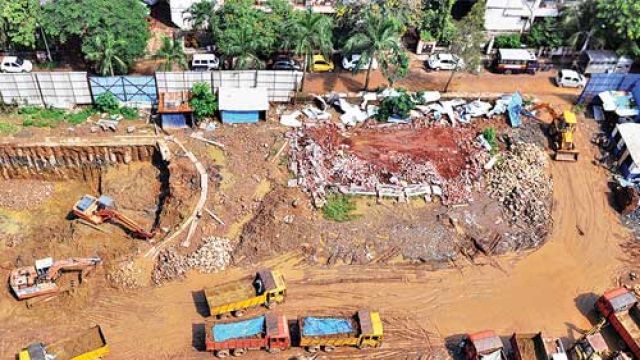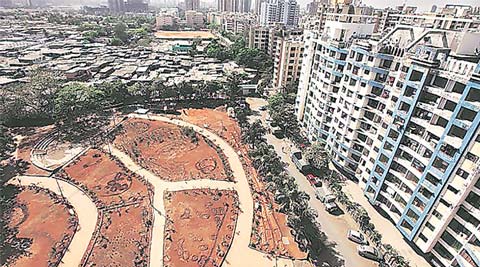Take a Story
A playground in Babulnath in south Mumbai was
leased to a school by the municipal corporation. The school took over the place
seemingly with honourable intentions. Gradually, the veneer began to peel. The
badminton court was let out for a fee; the ground was let out for weddings and
parties. Over time, the playground had reinvented itself as the geographical
extension of the school.
That, however, was not what was envisaged
when the Municipal Corporation of Greater Mumbai (MCGM) gave it out. The idea
was to maintain, and protect the space on behalf of the public.
So
issue kya hai ?
 |


- As a city, Mumbai lacks a
comprehensive vision for its few-and-far-between open spaces – 1,068 plots
measuring 1,200 acres, amounting to one square metre per capita as against
25 sq metres per capita in New York, and nine metres prescribed by the
World Health Organisation.
So how
Municipality (local body) is playing the spoilsport ?
- Far from mapping out these
precious green lungs and ensuring they ventilate the city, they are
readily leased to the first available customer, mostly to allow the MCGM
to get it off its charter of duties.
- After all, as the corporation
says, taking care of the open spaces does not fall under its obligatory
roster.
- Rather, it’s a discretionary activity, and clearly not important.
- All that it expects from its
lessees for such spaces – also called RGPG for recreation grounds,
gardens, parks and playgrounds – is a perimeter fence, a security guard
and a toilet; the rest was up to its imagination.
Toh
filhaal kya stithi bani huyi hai ?
- Given their orphan status, the city’s open spaces or whatever is left of them after their takeover by the private parties, are in shambles.
- The adoption is renewable every five years but none of the truant agencies misusing public space ever considered that as a deterrent in their ambitious plans for a virtual takeover of the land.
- The caretaker policy, developed in 1991, permitted construction on 15 percent of the area, such as club, gymnasia, etc.
- The history of the adoption and
caretaker policy of Mumbai of public open spaces is criss-crossed with
stories of brazen flouting of the rules like.
1.
rampant
misuse,
2.
illegal
construction,
3.
controlling
public access or restricting their hours of free access,
4.
exploitation
for commercial benefit,
5.
neglect
of maintenance,
6.
poor
or no security leading to encroachment, etc.
SCAM
kya hai ji ?
- Many a handover turns into a
takeover.
- It is common to find the agencies
managing the open spaces affiliated to politicians.
- The MIG Club in Bandra is a case
in point. In many clubs, the membership fee runs into lakhs of rupees,
which simply amounts to usurping of public ground for private benefit.
- So adoption policy has
systematically turned into an abduction policy...!
toh HUNGAMA toh banta hai...chalo
dekhte hai kya hua kaise hua !!
- This is the primary reason for the
hue and cry over the public open spaces policy, announced by the MCGM, and
now withheld by Maharashtra chief minister Devendra Fadnavis.
- The adoption policy was first
mooted in 2005 and stayed in 2007 by the then chief minister, the late
Vilasrao Deshmukh, after a public outcry.
- This is its second innings, and
could well go the same way. From 2007-2012, there was no policy in place
for open spaces.
- It was only in September 2012 that
the Maharashtra government formed a committee to prepare a comprehensive
policy framework for the planning of open spaces.
- The committee gave its report in
April 2014. The policy was adopted on 14 January, 2016, and stayed by
Fadnavis two days later.
Accha
POLICY hai ..usme kuch acchi cheezein bhi hongi..aur buri cheezein bhi hongi !!
pehle
ACCHI cheezein dekhte hai !
- The new policy favours only adoption and bans any construction except a toilet block and perhaps a shed if necessary.
- It also attempts to do away with restricted access, a common problem with the implementation of the policy so far.
- Preference would be given to local resident associations for adoption in a bid to ensure unrestricted access to local residents.
- Children and senior citizens would not be charged for the use of such an open space.
- Norms have been set for the entry fee too.
- The adopting agencies would come
under the Right to Information Act, 2005. This would make it easier to
identify mismanagement, apart from working as a deterrent.
 |
chalo ab FLAWs dekhte hai ..aur Indian Media
jaisi BURAI karte hai !!
- The policy mandates a monitoring committee and a scrutiny committee for applicants, both made up entirely of officials. There are no citizen activists or experts on either. Given the MCGM’s record of keeping vigil, this doesn’t inspire confidence.
- What if the monitoring doesn’t
work? In 2002, MCGM had moved court against Matoshree Arts and Sports
Club, Jogeshwari, and Kamala Vihar Sports Club, Kandivli, for not handing
over the plots back to the municipality after their blatant misuse. Even
after a favourable court order, the BMC still has to get the grounds back.
OPPOSITION
wale ...CRITICIZERS kya bol rahe hai ?
- Why does the MCGM want to give away public space to private entities? There is no need to create a third party interest. It has enough funds to manage them on its own..
- Raj Thackeray
say's....The entire policy is tailor-made to suit the builders’ lobby.
These builders will take over the ground, construct clubs and restrict the
entry of the common citizens, (interestingly he himself is a BUILDER ! )
MORAL OF
THE STORY...way forward !!
- An omnibus policy that lays down
the broad template for the upkeep of such plots woven with the peculiar
mix of individual requirements is the most suitable answer.
- Given the chequered history of
adoptions and caretaking, no private players should be involved.
- If the city is to live, it has to
breathe, and if it has to breathe, it needs its few green lungs intact,
not frittered away to whoever comes forward.
(Note:- This issue is limited to Mumbai and
UPSC may not directly ask something on this ..but it is always better to know
what are the issues going on in mega cities as it comes under the heading URBAN
GOVERNANCE ...this topic may be of help for people with Public Administration
and people from Maharashtra who get selected for Interview this year...!! )

